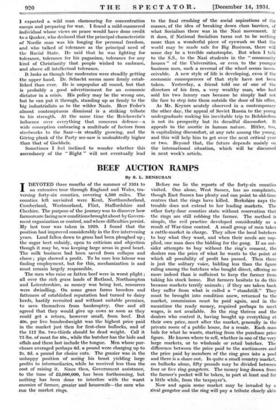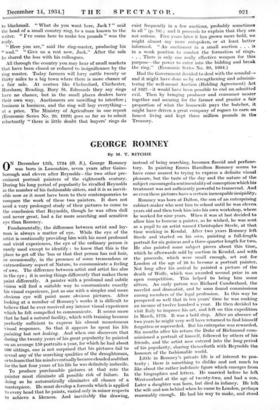BEEF AUCTION RAMPS
By S. L. BENSUSAN IDEVOTED three months of the summer of 1934 to 1 an extensive tour through England and Wales, tra- versing forty-six counties, covering 4,500 miles. The counties left unvisited were Kent, Northumberland, Cumberland, Westmorland, Flint, Staffordshire and Cheshire. The purpose of the journey was to discover how farmers are facing new conditions brought about by Govern- ment organization or control, and where difficulties persist. My last tour was taken in 1929. I found that the position had improved considerably in the five intervening years. Land fallen down to grass had been ploughed up ; the sugar beet subsidy, open to criticism and objection though it may be, was keeping large areas in good heart. The milk business had been saved from collapse and chaos ; pigs showed a profit. To be sure less labour was finding employment, but for this, mechanization is and must remain largely responsible.
The men who raise or fatten beef were in worst plight ; all over the rich grass lands of Rutland, Northampton and Leicestershire, as money was being lost, resources were dwindling. On some grass farms breeders and fatteners of established reputation had turned to dairy herds, hastily recruited and without suitable premises, to save themselves from bankruptcy. One and all agreed that they would give up cows as soon as they could get a return, however small, from beef. But 40s. per live hundredweight was the highest price paid in the market just then for first-class bullocks, and of the 112 lbs. two-thirds should be dead weight. Call it 75 lbs. of meat for 40s.; while the butcher has the hide and offals and these last include the tongue. Men whose pur- chases averaged perhaps ed. a pound were charging up to .2s. 3d. a pound for choice cuts. The grazier was in the -unhappy position of seeing his beast yielding large profits to intermediaries, while he received less than the cost of raising it. Since then, Government assistance, to the tune of £3,000,000, has been forthcoming, but nothing has been done to interfere with the worst enemies of farmer, grazier and housewife—the men who run the market rings. Before me lie the reports of the forty-six counties visited. One alone, West Sussex, has no complaints, though East Sussex has plenty and can point to old-time centres that the rings have killed. Berkshire says the trouble does not extend to her leading markets. The other forty-four counties state without reservation that the rings are still robbing the farmer. The method is simple, the evil practice developed considerably as a result of War-time control. A small group of men takes a cattle-market in charge. They allow the local butchers to buy what they want, and when their needs are sup- plied, one man does the bidding for the gang. If an out- sider attempts to buy without the ring's consent, the dealers run the price of what he wants to the point at which all possibility of profit has passed. Then there is just the solitary voice, bidding less than the figure ruling among the butchers who bought direct, offering no more indeed than is sufficient to keep the fanner from taking his stock home. But farmers hesitate to do this because markets terrify animals ; if they are taken back they suffer from what is called a " standstill." They must be brought into condition anew, returned to the market, commission must be paid again, and in the meantime the ready money, required perhaps to meet wages, is not available. So the ring thrives and the dealers who control it, having bought up everything at their own price, meet after the market, generally in the private room of a public house, for a resale. Each man bids for what he wants, starting from the purchase price figure. He knows where to sell, whether in one of the very large markets, or to wholesale or retail butcher. The difference between the price paid to the auctioneers and the price paid by members of the ring goes into a pool and there is a share out, In quite a small country market, on bullocks alone, fifty pounds may be divided between four or five ring gangsters. The money long drawn from the farmer's pocket will be taken, in part at least and for a little while, from the taxpayer's.
Now and again some market may be invaded by a rival gangster and the ring will pay a tribute closely akin to blackmail. " What do you want here, Jack ? " said the head of a small country ring, to a man known to the writer. " I've come here to make ten pounds " was the reply.
" Here you are," said the ring-master, producing his " wad." " Give us a rest now, Jack." After the sale he shared the loss with his colleagues.
All through the country you may hear of small markets that have been closed or reduced to insignificance by the ring master. Today farmers will lorry cattle twenty or thirty miles to a big town where there is more chance of a fair sale. At centres like Chelmsford, Chichester, Horsham; Reading, Bury St. Edmunds they say rings have no chance, but in the small places dealers have their own way. Auctioneers are unwilling to interfere ; business is business, and the ring will buy everything— at a price. The Ministry of Agriculture in one report (Economic Series No. 20, 1929) goes so far as to admit reluctantly " there is little doubt that buyers' rings do exist frequently in a few auctions, probably sometimes in all " (p. 70) ; and it proceeds to explain that they are not serious. Five years later it has grown more bold, we might almost say more outspoken, or at least better informed. " An auctioneer in a small auction . . . is in a weak position to combat the formation of rings.
• . . There is only one really effective weapon for this purpose—the power to enter into the bidding and break the ring." (Economic Series No. 39, 1934.) Had the Government decided to deal with the scandal— and it might have done so by strengthening and adminis- tering the well-meant Auction (Bidding Agreement) Act of 1927—it would have been possible to end an admitted evil. Then by bringing producer and consumer nearer together and securing for the farmer and grazier a fair proportion of what the housewife pays the butcher, it might have driven a great company of rogues to earn an honest living and kept three million pounds in the Treasury.








































 Previous page
Previous page